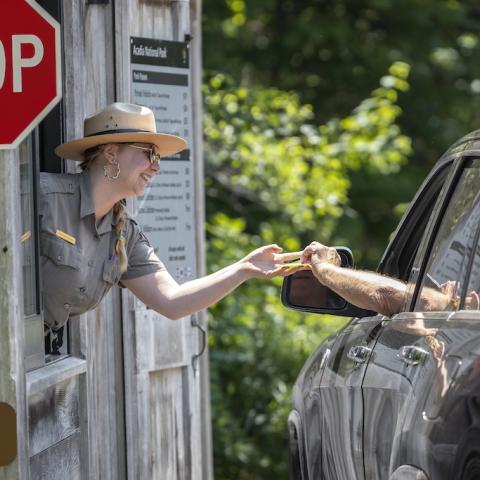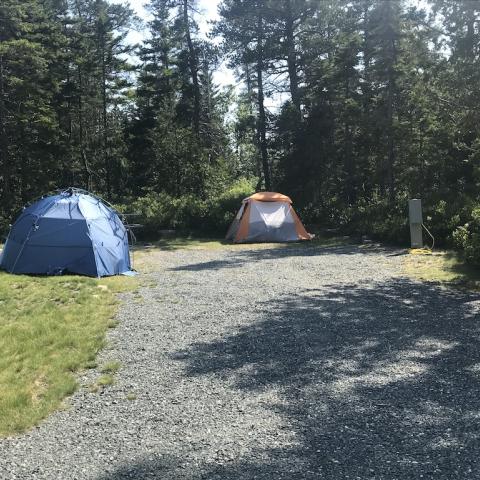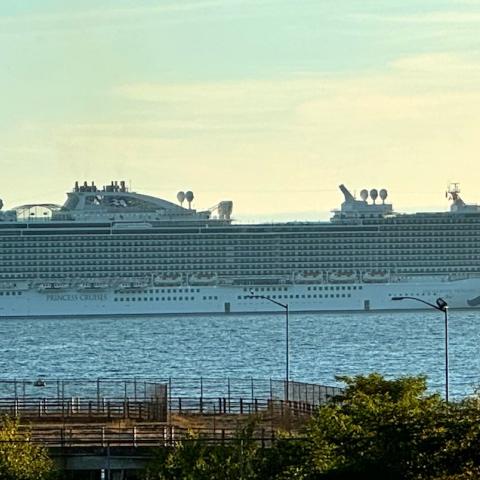
There were vacant campsites to be found at Schoodic Woods Campground at Acadia National Park/Kurt Repanshek
I came across an unusual sight this past week: A national park campground that had vacant spots. In mid-July!
True, this wasn’t in Yellowstone, or Yosemite, or Glacier national parks. It was the Schoodic Woods Campground at Acadia National Park in Maine. There, among the pines and cool ocean breezes, were more than a few campsites waiting vacant.
It’s a glorious setting for a campground, too. Not far from the Atlantic Ocean nor Frenchman Bay, a short drive from the nonprofit Schoodic Institute that not only conducts research important to Acadia National Park but helps train tomorrow’s scientists, and with some easy hikes and countless tide pools nearby to explore.

Gorgeous color against gorgeous scenery abounds at Schoodic Peninsula in summer/Kurt Repanshek
For those weary of dealing with crowds, vehicle congestion, and standing in line, the Schoodic Woods Campground and Schoodic Peninsula are precious treasures in the National Park System. They’re uncrowded, clean, refreshing, and relaxing.
This is the other, quieter side of the National Park System. There are a few out there. There’s Cataloochee Valley in Great Smoky Mountains National Park in North Carolina. Cathedral Valley in Capitol Reef National Park in Utah. Juniper Campground at Theodore Roosevelt National Park in North Dakota. Possibly the Lizard Creek Campground at Grand Teton National Park in Wyoming. The Butte Lake Campground at Lassen Volcanic National Park.
With the crowds that have been flooding the National Park System in recent years, you have to be a bit creative, definitely flexible, and look beyond the name brand destinations in the parks. That doesn’t mean you have to sacrifice your summer vacation for a lesser destination.

Ocean, gulls, and you at Schoodic Peninsula/Kurt Repanshek
Sitting on the rocky coast of the Schoodic Peninsula, I had the setting to myself. Well, except for some herring gulls that were snagging crabs from the tide pools, hauling them 20 or so feet into the sky, and then dropping them to let the rocks crack the shells open for a tasty meal. Off shore, colorful buoys bobbing on the water’s surface marked lobster pots, and whale-watching or puffin tour boats were cutting wakes through Frenchman Bay.
At low tide, open-air aquariums made out of rock and sand and swaying with sea weeds are entertaining coastal features. Most have crabs of varying sizes, some have anemones, and all have some types of snails and even mussels.
Schoodic is an overlooked aspect of Acadia National Park. You can see it when you stand atop Cadillac Mountain and look east across Frenchman Bay, but to reach it requires a drive of about an hour or so. That alone seems to keep folks from making the drive. Even Samuel Champlain, who named Mount Desert Island back in 1604 when he sailed past it, considered Schoodic too insignificant to visit it.
Though Acadia joined the National Park System in 1916 under the name Sieur de Monts National Monument, and was renamed Lafayette National Park in 1929, it took another decade of work by George Dorr and his allies to gain 2000 acres of the Schoodic Peninsula for the national park.
Allen K. Workman’s wonderful book, Schoodic Point, History on the Edge of Acadia National Park, is a great resource if you’re seeking background on this heavily forested slice of Acadia.

Many campsites at Schoodic Woods Campground are well shielded from others/Kurt Repanshek
What is there to do at Schoodic? The camping in Schoodic Woods is peaceful, there are hiking trails that wind through the peninsula, at low tide the tide pools with their marine life are fascinating, and you can even try catching your dinner from Frenchman Bay. They say that Mackerel can sometimes be hooked by anglers from Frazier Point from mid-July through September. I, sadly, did not come prepared for that opportunity.
Check out Schoodic Institute’s website — schoodicinstitute.org — for public events. They host programs and outings, such as looking for puffins on Petit Manan Island and art classes focused on coastal landscapes and structures.
Though my visit came in mid-July, the air was on the cool side…cool, certainly, when compared to Cape Cod, Cape Hatteras, or Cape Lookout. And the humidity was nothing when matched against that of Florida.
Crowds are not likely to decline across the National Park System in coming years. But with some planning and thinking a bit outside of the box, you still can find solitude and beauty without having to hoist a pack on your back and hike 10 miles into the backcountry.
Although, that’s not a terrible option, either….




 Support Essential Coverage of Essential Places
Support Essential Coverage of Essential Places







Comments
Thanks, Kurt, for alerting all the travelistas out here to the Schoodic Peninsula. I'm confident they will ensure it won't continue to be peaceful and uncrowded.